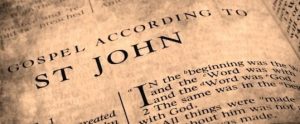The work of a translator is much appreciated so that ideas can be shared across cultures. Translating the Bible is a wonderful service to the faithful and to all who are curious, but the task is fraught with challenges, which Ronald Knox described in Trials of a Translator (New York, Sheed & Ward, 1949).
In the mid-1950s La Bible de Jerusalem constituted a great service to the Church in Francophone countries, coordinated by the Dominicans of L’Ecole Biblique in Jerusalem. The translation into English needed improvements so the Jerusalem Bible of 1966 gave way to the New Jerusalem Bible in 1985, under the supervision of the Benedictine scholar Henry Wansbrough. Recently he launched the Revised New Jerusalem Bible at St. Benet’s Hall in Oxford. Margaret Hebblethwaite reported in this event in The Tablet under the title “The search for the right word of God.”
This report, with the superscription “The Gospels and anti-Semitism,” focuses on the challenge to translators with regard to the Greek work ioudaios in the plural, used 70 plus times in John and traditionally rendered “the Jews.” The term usually refers to the religious leaders in Jerusalem, who investigated the identity of John the Baptist (John 1:19) and the reason for Jesus’ disruptive action in the Temple area (2:19). The polite tone of their inquiry gave way to intense hostility after Jesus healed the paralyzed man at the pool Bethesda on the Sabbath (5:15-18).
In October 1997 I gave a paper at an international intra-ecclesial conference in the Vatican on “Anti-Judaism in the Christian Environment.” I sketched the scholarly efforts after the Second Vatican Council to deal with this problem for translators, which you can access and download here.
Among recent contributions to this topic, I wish to draw attention to the judicious and irenic statements in The Jewish Annotated New Testament edited by Amy-Jill Levine and Marc Zvi Brettler (New York: Oxford University Press, 2017, second edition), especially to Joshua Garroway’s essay “Ioudaios” (p. 596-99) and Adele Reinhartz’s commentary on the Gospel according to John (p. 172-73). These succinct efforts to grapple with a thorny issue deserve our careful attention.
Another recent contribution to biblical scholarship with a pastoral and spiritual perspective is The Paulist Biblical Commentary, edited by José Enrique Aguilar Chiu and others (New York: Paulist Press, 2018). Francis J. Moloney’s commentary on John reviews the topic under “Special Issues” (p. 1109-10). “The expression ‘the Jews’ does not indicate an ethnic group, but those who make a theological and christological decision against Jesus of Nazareth… In the Gospel of John, ‘the Jews’ are not a race; such an interpretation must be rejected energetically.”
How can the pastor deal with the anti-Jewish bigotry that may be aroused among the people listening to the Gospel on Good Friday and on The Second Sunday of Easter (“for fear of the Jews” in 20:19)? A brief statement can be read before the Passion is proclaimed on Good Friday to recall the message of the Second Vatican Council in the Declaration on the Church’s Relation to Non-Christian Religions (Nostra aetate): “True, the Jewish authorities and those who followed their lead pressed for the death of Christ (John 19:16); still, what happened in His passion cannot be charged against all the Jews, without distinction, then alive, nor against the Jews of today.” A clarification that in these texts “the Jews” means the religious authorities in Jerusalem can be made on other occasions. Of course, there should be opportunities for all the faithful to engage in Bible study so that their faith is enriched and the misinterpretation by generalization or stereotype is overcome.
Translators are to be praised for their attention to this problem, but education is the ongoing challenge for all teachers in the parish and school. To end on a benign note, I draw attention to the fine essay by Professor Otto Betz, “To Worship God in Spirit and Truth: Reflections on John 4:20-26” in the J.M. Oesterreicher Festschrift Standing Before God (New York: Ktav, 1981, p. 53-72). “Salvation is from the Jews” is understood in light of Genesis 49:10-11, pointing to Jesus as the Savior of the world (John 4:42).


I love Mr. Ahr’s helpful comment. I have been puzzling about this term for some time.
Thank you for your comment!
Professor Betz’s essay was published in Jesus, der Messias Israels : Aufsätze zur biblischen Theologie, which you can access for free on the Internet Archive’s site at https://archive.org/details/jesusdermessiasi0000betz. The article may be found on pp. 420-438.
If you don’t already have an account with the Internet Archive, you can create one here: https://archive.org/account/signup.
I have had no luck in finding the essay by Professor Otto Betz, “To Worship God in Spirit and Truth: Reflections on John 4:20-26”
Can you help me find it?
Thank you for whatever assistance you might provide.
Thank you for your commentary, Dr. Ahr, and especially for sharing your reminiscence of your and Msgr. Oesterreicher’s discussion!
I remember discussing this with Monsignor Oesterreicher. He made the point, which I find persuasive, that John uses “Ioudaioi” to refer specifically to the religious authorities centered in Jerusalem. John himself was a Jew, who knew those people; he “was known to the high priest”, as he says in chapter 18, and he gives a plausible account of the Sanhedrin discussion of their problem with Jesus in chapter 11. It is also clear in John and the other gospels that Jesus and his disciples were all Jewisn, as were in all probability all or most of the community for whom John composed his gospel (the “we know” in chapter 21). John is also quite aware of the religious tension between the Jews and the Samaritans; the Samaritan woman in chapter 4 speaks of Jesus as a “Ioudaios”, and he accepts this designation. Note that this is the only point in the gospel that Jesus is called “Ioudaios”, and it is by someone who is not Jewish; it is an othering word.
On the other hand, Nicodemus, in chapter 3, is called “a Pharisee, a ruler of the “Ioudaioi’.” The “Ioudaioi” are the adversaries of Jesus in the discussion of the bread which Jesus gives in chapter 6. In chapter 7 Jesus goes to Galilee and not to “Ioudaia”, because the “Ioudaioi” are seeking to kill him. Later in that chapter Jesus does go to the Temple to teach, and the “Ioudaioi” challenge him. Indeed, throughout this section of the gospel, the “Ioudaioi” are always the people in or around Jerusalem, although some “Ioudaioi” come to believe in him.
If, then, John understands that Jesus and the disciples are Jewish (without ever describing them as “Ioudaioi”), what does that term signify in the gospel? It is clear that the “Ioudaioi” specifically refers to the Jews in Jerusalem; it is a geographic reference, not a religious or ethnic one. Monsignor Oesterreicher suggested that John’s usage is similar to the way we Americans understand the term “yankee”: for us in the Middle Atlantic, the “yankees” are the New Englanders; for southerners, the “yankees” are all northerners; for Mexicans, the “yankees” are all North Americans.
In that case, not all Jews are “Ioudaioi”, just some of them “down there in Jerusalem”. It’s an “us versus them” word: “those guys” are the problem. So it makes no sense to translate that word as “Jews”, and in fact that translation misses the point that John is making when he is using it. It is much closer to John’s usage to translate it as “the Judaeans”; the folks who live in “Ioudaia”.
John and Jesus and Jesus’ disciples are all Jews; his adversaries are “the Judaeans.”